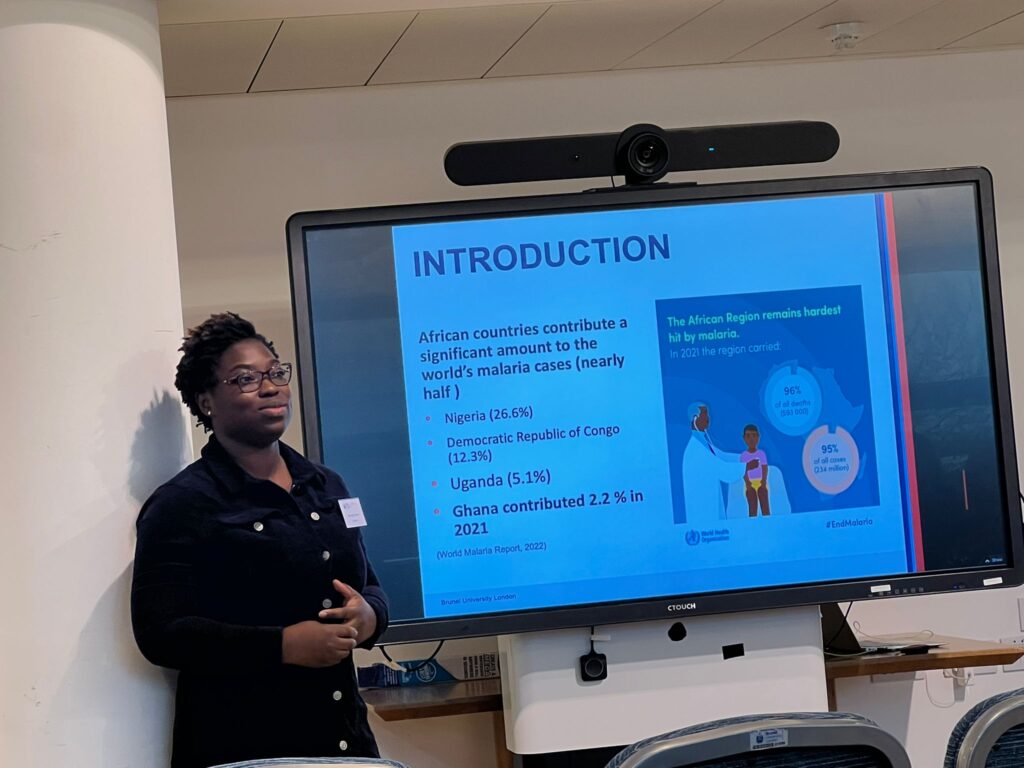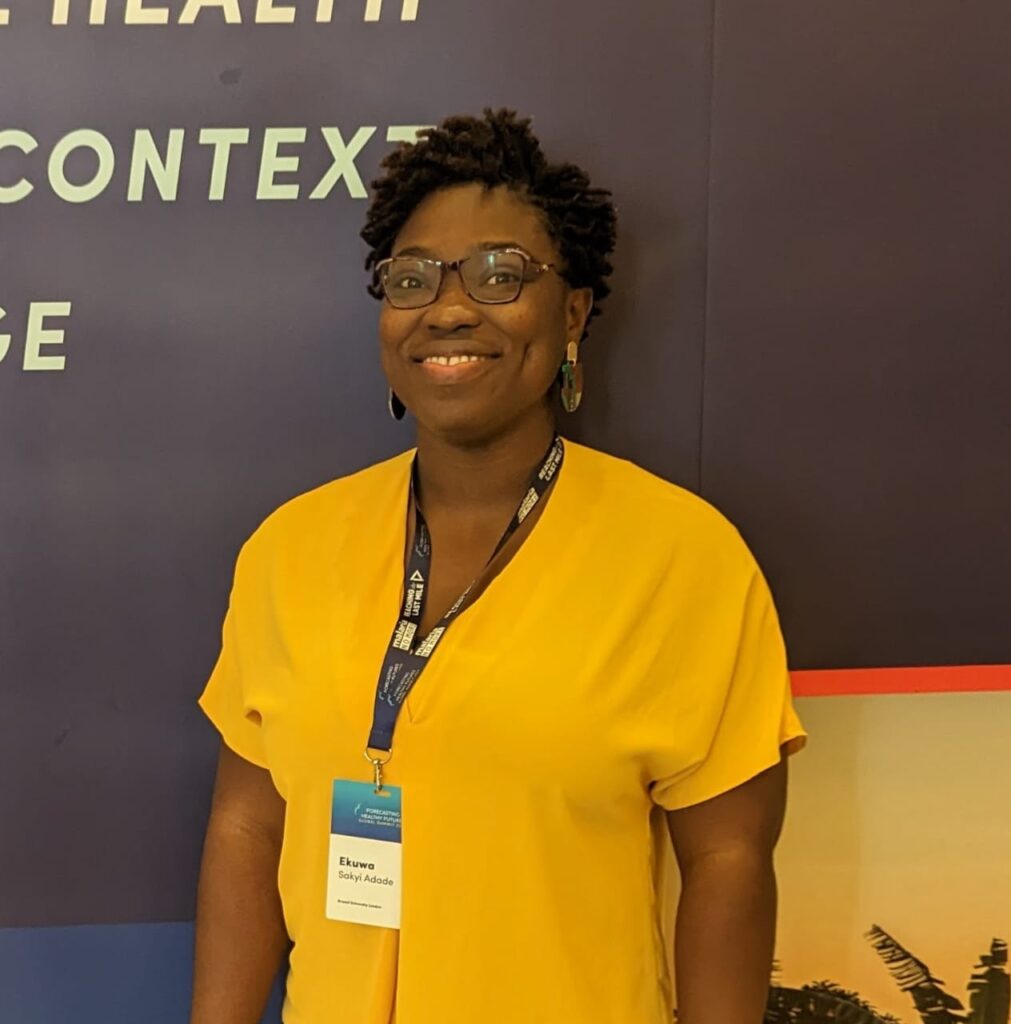
As part of Forecasting Healthy Futures’ mission to support emerging researchers at the intersection of climate and health, we spoke to Ekuwa Adade, a doctoral researcher at Brunel University London, and a member of the IMACS Expert Network. Adade, who is researching climate sensitive diseases, recently launched a malaria modeling project as part of her doctoral research focused on her home country, Ghana. IMACS is mentoring Ekuwa in understanding and comparing different time series models and helping advance her skills in integrating climate and malaria surveillance information using advanced machine learning.
How did you get into studying this area of climate sensitive diseases?
ADADE: I started out training as a nurse in Ghana, but I found myself not really liking public health, because I thought too many nurses had gone into it. I still wanted to do something that had to do with the environment, but I wanted to do something different from what everybody was doing. I came across an environmental health nurse and thought, this is different! So, I developed an interest in learning more about the influence of the environment on health. I had also been working in the orthopedic ward, so I saw people coming in from injuries related to traffic incidents. My concern was that I could see traffic wasn’t being managed well since so many people were getting into accidents. So, I just started thinking, everything is happening because of the environment so I wanted to learn more about the impacts of the environment on health.
It was during that period that I got exposed to climate change and its impacts on health, so I decided to pursue a PhD in that area. In considering what I wanted to study, I found malaria to be the most common disease in our country, and among the top 10 killer diseases in our country. And globally, it’s a huge issue. So, I thought if I have this privilege of learning about climate change and sustainability then I should look at how it influences malaria.
Today, the topic of my thesis is an examination of climate sensitive disease with a focus on malaria. Presently, I’m in the state of data analysis. When you look at the malaria data in Ghana, you realize there was a sharp rise in cases from 2008 to 2013/2014. And then you see a steady decline. And so, the question for me was, was this because there were malaria control programs being run or was this due to the impacts of climate on malaria? And was the climate in Ghana itself conducive to malaria transmission? So that has been my focus … looking at temperature, humidity, and precipitation. And I looked at the changes that went on between that period where malaria cases were extremely high and when they started coming down to see if, behind the scenes of malaria interventions, if climate change was playing a role in Ghana or not.
Why was malaria an important area to focus on in your research?
I have yet to meet anyone in Ghana who hasn’t gotten sick from malaria. It’s really that common. Personally, I have had several episodes of malaria as well as my family members and friends. But where I live, I have access to information as well as a pharmacy or clinic. And we can take proactive measures. You sleep in a mosquito net, or you keep your environment very neat. But if you go to other areas of Ghana, where they don’t have access to that much information, you really see how terrible it is.
For those who get malaria, the symptoms can be quite severe. Most get a fever, vomiting, diarrhea, and experience weakness. In fact, we are so aware of malaria, that when anybody gets a fever, the first instinct is that it must be malaria. That’s how common it is.
So, I think that me being a nurse and championing this cause of looking at malaria is an additional benefit to healthcare facilities.
What have you learned from your research so far?
ADADE: I looked at the climate variables between 2008 to 2014 and then again to 2022. And I found there was a notable trend and pattern that suggests there had been a shift and that climate had played a role. So even at this point in my research, I can say that indeed climate variability in Ghana really had a role to play in the current change of malaria disease in my country.
How do you hope your research will be used?
ADADE: I am looking at doing the final analysis with the IMACS team and potentially informing policy and bringing various stakeholders together to discuss my findings. And hopefully, we will have an opportunity to look at how to implement strategies to climate-proof communities, at least enough to deal with whatever climate changes may pose on malaria disease.
How does this make you feel?
ADADE: I feel most nurses haven’t built a career path this way. So, I feel I’m one of only a few people in this area with a nursing background. If indeed my findings are a major contribution, I would feel have something substantial to offer. And I feel very proud of that and what I have done, because as a nurse I have tried to investigate what could potentially change a disease that has been uncontrollable and has been a very concerning disease in my country. So, I feel that I’m in the right space and the right area, and my research is very important.
What has been your experience with the IMACS team?
ADADE: I had the privilege of coming across the Forecasting Healthy Futures Summit last year after seeing it promoted on LinkedIn. I applied for a scholarship and had the privilege of being sponsored to attend in Abu Dhabi.
It was during that Summit that I came across IMACS. Before then, I had been thinking my research area maybe wasn’t that important. Like maybe I had an imposter syndrome feeling, and I worried that maybe I was too all over the place with my research. But after seeing a presentation by IMACS last year, I realized, wow, I’m at a good place. And this is something that has also been done in India and Indonesia.
So, during the networking sessions I followed up and since then, and IMACS’ Dr Kaushik has been guiding me on the final analysis of my studies. I’m hopeful that I can continue to use their support to analyze the data that I have at an advanced level. And then if I get an opportunity to extend my research after school, I’m hopeful the Ghana health services can also benefit by looking at live forecasts and climate variabilities, like what Dr. Kaushik has been developing, for short and midterm planning purposes in-country.

###
